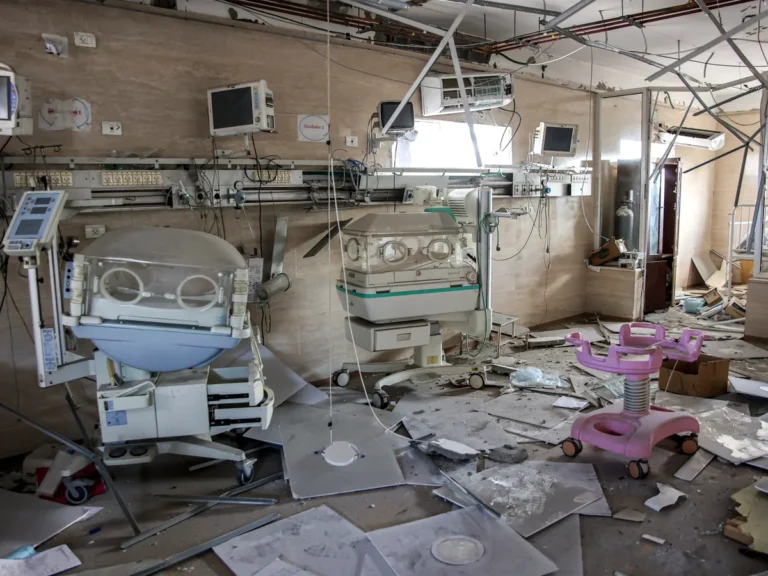Rhiannon Lucy Cosslett, The Guardian.
I thought we all believed in a collective responsibility towards children. This terrible conflict has made me question that.
Ihave seen images on my phone screen these past months that will haunt me as long as I live. Dead, injured, starving children and babies. Children crying in pain and in fear for their mothers, fathers, sisters, brothers. A small boy shaking in terror from the trauma of an airstrike. Scenes of unspeakable horror and violence that have left me feeling sick. Sometimes I skip over these photos and videos, afraid perhaps of what I will see next. But more often than not, I feel compelled to bear witness.
I know I am not alone. So many of us, privileged in our comfort and safety, have watched the suffering of the children of Gaza through social media, images mixed in jarringly with ads and memes and pictures of other people’s children, smiling and safe. It renders the horror even more immediate: these could be your kids, or mine, or any kid you know, but for the lottery of birth.
Many thousands of people have used their voice to speak up for these children and their families, whether in writing to politicians, making donations to charities and aid organisations, or taking to the streets. Yet this war on children continues, and there is an overwhelming sense of powerlessness to help them. It is hard to imagine how it can get any worse, but worse it gets with news this week that 14,000 babies are suffering from severe acute malnutrition, according to the UN. The reason is deliberate starvation: famine as a weapon of war or, as Human Rights Watch puts it, a “tool of extermination”.
This overarching sense of impotence when confronted with unimaginable horror is creating a mass sense of moral injury – a form of profound psychological distress that can happen to people when they are forced to act, or indeed not act, in ways that are in direct opposition to their values or moral code. I first came across the term when speaking to medical professionals who were developing PTSD during the pandemic. Doctors, nurses and care workers were in anguish at not always being able to provide treatment to patients who so desperately needed it, owing to a lack of equipment, resources and leadership, and the sheer volume of seriously ill people.
Nowhere will this kind of distress be more keenly felt than in Gaza itself. For the medical professionals and aid workers there, sadness, guilt, betrayal, even, that you can’t help everyone must be a daily reality. When it is your job to help, to feed, to treat, being unable to do so is a profound trauma.
And for Gaza’s parents it must be torture of the most excruciating degree to see your child crying in hunger and be unable to feed them. I often think of the babies who were in the neonatal intensive care unit under bombardment – that photograph of the newborns in al-Shifa hospital laid seven to a bed to keep them warm and alive. I wonder about their mothers, many of whom will have been forced to give birth without proper pain relief and equipment. Where are they now? How many of them survived? And what did that do to the medics who tried so hard to save them?
But I have also started to wonder about the impact of moral injury by proxy and at scale. I am in no way putting it on a par with what people on the ground are experiencing. But that feeling of powerlessness and, as an extension, complicity: what does it do to those around the world who feel what is happening is wrong? What is the impact of witnessing so much profound suffering – even through a screen – and feeling unable to act or to force others to act?
I now understand why my mother stopped watching the news after I was born. It was because she couldn’t bear it. I too have felt a temptation to look inwards since having my son, to cocoon us in the warmth and safety of our privileged lives. But the internet means it’s more difficult to detach – the news runs in continuous parallel to our lives, eroding borders. There have been many nights when I have put my son to bed, his belly full, his pyjamas clean and soft, and I have cried silently for these other children who are not being tucked up in warm beds. In the early hours when he would wake for milk, all I had to do was go to the fridge and pour him some, and we would sit, listening not to the sounds of bombs but to the birdsong that seemed to fill the skies.
The contrast between his safety and their peril feels to me obscene. Could that be a kind of moral injury? There is something about being in the daily company of a little person – their innocence, their vulnerability, their silliness, their loving nature – that makes the pain of any other child feel like a profound affront. But I know you don’t have to be a parent to feel horror at what is being inflicted on Gaza’s children in the most visceral way. I believe – or at least I used to – that it is ingrained in us, as humans, to feel a collective responsibility towards children, and that this collective responsibility can extend beyond borders.
Feeling powerless in the face of such egregious injustice can result in a loss of trust or faith, not just in governments and institutions but also in the moral order of the world, and its ability to protect children. I wonder what the impact of this will be: will it, as certain politicians no doubt hope, result in a numbness that presents as indifference? Traumatic events can result in a lack of affect – millions more people should be marching and raising their voice – but they can also be channelled into righteous anger.
I certainly feel a profound loss of faith. Something I felt to be true about humanity – that people are fundamentally good, that we owe it to children to protect them – has shifted because of this conflict. I walk around with a feeling of heaviness that I cannot seem to shake. Thousands of miles from Gaza, I am changed by the past 18 months. I have learned that, for some people, compassion for children has political limits. What does one do with that terrible knowledge once it sits inside you like a leaden stone? I don’t seem be able to find an answer.


